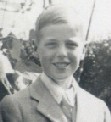
 George - An Evacuee's Story
George - An Evacuee's Story
George's Family Life During the War
Back to George Home
In the 1930's the family lived in Barrow Street, West Bromwich, in a terraced house. The house was quite small, so Bill and George shared the back bedroom. The kitchen had a big range. Bath time was once a week, in a tin bath in front of the range! However, in 1938 a plumbed in bath was fitted, in a corner of the kitchen. It had a lid over it so it looked less like a bath. The toilet was outside in a small shed in the garden, so chamber pots were used if you 'had to go' in the middle of the night!
The two boys went to Beeches Road School. They had walked to Beeches Road, but after George passed the necessary exam he went to the Grammar School (the same one his grandfather taught at). The Grammar school was further away, so he sometimes caught the bus there.
Pocket money was 6 pence (today worth 1.11) a week from Mum (nothing from Dad, who was very strict). Sometimes the boys would help in the pharmacy though, by counting out saccharine tablets (sweetener) and putting them into little packets. Their Grandad was very fond of them and would sometimes give them half a crown, which was an enormous amount of money then. Pocket money was spent on books, but not on sweets very often even though their Aunt owned a sweet shop! Favourite books were the 'Just William' and the Biggles series.
At school, milk was provided each morning, about 1/3 of a pint, in a little glass bottle. The tops were aluminium foil, and were kept for recycling. There was lots of recycling as resources were scarce. School dinners weren't provided, and everyone either took sandwiches or went home for lunch. National Savings stamps were sold at school 6 pence (today worth 1.11) per week. School teachers were very strict, and pupils got the cane if they were naughty. There was assembly every day, with a hymn being sung. The lights in the school were gaslights, not electric. One of the teachers Miss Eyre had a radio ('wireless') with an acid battery. This had to be charged up at intervals.
There were no air raids until 1940, but everyone was still worried about them. If there was an air raid, the family had to rush down to the cellar. They would take a blanket to keep them warm, and try to sleep. The cellar had electric light, so they were OK as long as the power stayed on. If there had been an air raid the previous night, the boys were allowed to go to school an hour later in the morning. Later in the war, the warehouse at the end of their street was hit by a bomb - George and Bill's house lost some tiles off its roof.
The Daily Mail carried lots of propaganda about the war, and casualties were only reported briefly, if at all. Fun was poked at military leaders like Hitler and Mussolini even the comics (Beano, Dandy, Boys' Own) had cartoons about them.
During the war the Government promoted 'Holidays at Home' this was so that fuel could be kept for the essential services.
The boys had piano lessons from their Grandad. There was a piano in the front room, and they were taught some of the well-known classical pieces.
George and Bill had a wireless at home from 1938. This was very new and unusual. It was made by Ekco, and had a long aerial that stretched all along the garden about 30 feet. You could get short, medium and long wave. The house also had a gramophone to play records on.
Bill went to the Technical College after leaving school at 15, and later worked as a projectionist at the Tower Cinema in the town. There were 5 cinemas then and the Tower was a Grade A one the best type so the film stars used to come to the cinemas in person to advertise their new films. (remember that there weren't TV's then to advertise films on) Bill remembers seeing stars of the time Wilfred Hyde White, Diana Dors, and William Hartnell (who played the first Dr Who on TV).
Most people went to the cinema at least one a week. All the films were black and white then, colour films only arriving in 1941. The films in those days were quite brittle and used to break a lot. (When they did the audience cheered!) As their Dad worked at a chemist's shop he was able to mix up chemicals to make the glue to mend the films, so the boys got in free. (It would normally have cost 6 pence - today worth 1.11)
Back to George Home
Page last updated: 25th February 2014
